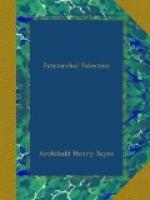Before his return to Egypt he received the tribute of “the king of Sangar,” or Shinar, in Mesopotamia, and “of the land of Khata the greater.” The first consisted for the most part of lapis-lazuli, real and artificial, of which the most prized was “the lapis-lazuli of Babylon.” Among the gifts was “a ram’s head of real lapis-lazuli, 15 pounds in weight.” The land of the Hittites, “the greater,” so called to distinguish it from the lesser Hittite land in the south of Palestine, sent 8 rings of silver, 400 pounds in weight, besides “a great piece of crystal.”
The following year Thothmes marched through “the land of Zahi,” the “dry land” of the Phoenician coast, to Northern Syria, where he punished the king of Anugas or Nukhasse, who had shown symptoms of rebellion. Large quantities of gold and bronze were carried off, as well as 15 chariots, plated with gold and silver, 6 iron tent-poles studded with precious stones, and 70 asses. Lead and various kinds of wood and stone, together with 608 jars of Lebanon wine, 2080 jars of oil, and 690 jars of balsam, were also received from Southern Syria, and posting-houses were established along the roads of the land of Zahi. A fleet of Phoenician merchant vessels was next sent to Egypt laden with logs of wood from the forests of Palestine and the Lebanon for the buildings of the king. At the same time, “the king of Cyprus,” which now was an Egyptian possession, forwarded his tribute to the Pharaoh, consisting of 108 bricks of copper 2040 pounds in weight, 5 bricks of lead nearly 29,000 pounds in weight, 110 pounds of lapis-lazuli, an elephant’s tusk, and other objects of value.
The next year (B.C. 1468) there was a campaign against the king of Naharaim, who had collected his soldiers and horses “from the extreme ends of the world.” But the Mesopotamian army was utterly defeated. Its booty fell into the hands of the Egyptians, who, however, took only ten prisoners, which looks as if, after all, the battle was not on a very large scale.
In B.C. 1464 Thothmes was again in Northern Syria. Among the booty acquired during the expedition were “bowls with goats’ heads on them, and one with a lion’s head, the work of the land of Zahi.” Horses, asses and oxen, 522 slaves, 156 jars of wine, 1752 jars of butter, 5 elephants’ tusks, 2822 pounds of gold besides copper and lead, were among the spoils of the campaign. The annual tribute was only received from Cyprus, consisting this time of copper and mares, as well as from Aripakh, a district in the Taurus.
The next year the Pharaoh led his troops against some country, the name of which is lost, in “the land of the hostile Shasu” or Beduin. The plunder which was carried off from it shows that it was somewhere in Syria, probably in the region of the Lebanon. Gold and silver, a silver double-handled cup with a bull’s head, iron, wine, balsam, oil, butter and honey, were among the spoils of the war. Tribute arrived also from “the king of the greater Hittite land,” which included a number of negro slaves.




